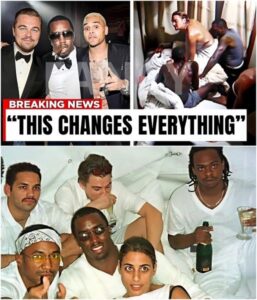Hollywood is always full of gossip, but one constant issue is how the big shots, like famous actors and producers, like to boss around the newcomers. It’s not just mind games they play; they also pay them less and sometimes physically abuse them. Tichina Arnold recently spilled the beans on the industry, calling out Tyler Perry and Sean ‘Diddy’ Combs for their behavior and how they run things in Hollywood. Many celebrities have also previously highlighted this issue; however, Tichina has exposed more than that.
Tichina Arnold is a talented black actress who has made a big impact in Hollywood over many years. She’s won over audiences with her great performances in both movies and TV shows. One of her famous roles was in the TV show *Martin*, where she played the lively character Pamela James. Her funny and charming performance made the show a classic, showcasing her talent. She also did an excellent job in the sitcom *Everybody Hates Chris*, playing the tough but funny Rochelle Rock. The show received praise, highlighting her acting skills. Tichina Arnold’s legendary status in Hollywood isn’t just about her talent but also her enduring career. She’s known for delivering outstanding performances in various roles, showcasing her versatility. Beyond acting, she uses her fame to advocate for diversity and more opportunities for black actors in the entertainment industry.
Currently, Tichina Arnold is addressing significant issues in Hollywood. Despite her fame, she’s facing challenges like being underpaid. She’s opened up about these struggles, speaking out for better healthcare, fair residuals, and equal treatment for black actors in the industry. Arnold is actively advocating for these important changes. She is exposing the Hollywood industry agenda where famous Hollywood actors get underpaid. She quoted that she has also gotten paid just one cent in residuals, even though the residual paper costs more than that.
One individual at the center of the controversy is Tyler Perry. A few months ago, Mo’Nique took the stage at the Apollo Theater and strongly criticized Tyler Perry, director Lee Daniels, and Oprah Winfrey. She accused them of unfairly sidelining her from Hollywood. The Oscar-winning actress, known for her comedy, spoke candidly about her strained relationships with Perry, Daniels, and Winfrey. Many remember her role in Daniels’ 2010 film *Precious*, but since then, she has only appeared in four films. She attributes this to what she calls their blackballing of her. In 2015, Mo’Nique first revealed that she felt blackballed by this trio. In response, Daniels told *The Hollywood Reporter* that Mo’Nique’s demands during the making of *Precious* didn’t always align with the promotional campaign and that it negatively affected her relationship with Hollywood.
Mo’Nique countered, saying, “No, I was not blackballed; I was white-balled by some black d’s who have no balls. Thank you, Mr. Lee Daniels. Thank you, Mr. Tyler Perry. Thank you, Miss Oprah Winfrey.” She continued, “You are not paying me equally. You are not treating me fairly.” In 2009, Mo’Nique had a plan to embark on a press tour for the movie *Precious*, which was co-produced by Oprah and Tyler Perry. The surprising part was that they had no plans to pay her for the tour, and Mo’Nique was already exhausted from the filming process. Facing this situation, Mo’Nique made the decision to skip the tour and take a break with her family. Initially, everyone appeared to be okay with her decision.
Mo’Nique has openly called out Oprah and Tyler Perry, seeking an apology for the situation surrounding the press tour and other issues. However, as of now, the apology she requested is still missing in action. Mo’Nique and Tyler Perry are reportedly at odds, with rumors suggesting she’s ready to spill his secrets. With her extensive industry experience, she might have some inside scoop. Tyler Perry, known for his success in Atlanta theater and media series, hasn’t had a smooth journey. It’s said that his ego could have caused clashes even with influential figures like Oprah. In Hollywood, making it big may involve some questionable moves, and Perry seems to be no stranger to such strategies.

After conquering the box office, Perry ventured into TV with the popular sitcom *House of Payne*. However, things got messy when it came to securing a syndication deal and a spin-off titled *Meet the Browns*. Reports indicate that Perry let go of four writers seeking union contracts, causing industry drama. This move received criticism, with one affected writer, Teri Brown-Jackson, feeling used and disrespected. She said, “We were good enough to create over 100 episodes, but now when it comes to reaping the benefits of the show being syndicated and having other spin-offs from it, he decides to let us go unless we accept a horrible offer.” Kelly Griffin, the head writer for *House of Payne*, reportedly declared that she’s not backing down without putting up a fight. Tyler Perry asserted that he’s personally handling all the writing, stating that he is taking charge of crafting the content himself.
In an era where women of color should be standing as leaders on an equal footing with male actors, it’s disheartening that not many non-black celebrities have been vocal about this issue in Hollywood. Just last year, Sofia Vergara was the only non-white woman on Forbes’ list of the 10 highest-paid actresses. Shockingly, there was no mention of a black woman on the list, which was predominantly comprised of all-white actresses, with Scarlett Johansson taking the top spot. A-list names like Elisabeth Moss, Jennifer Aniston, Margot Robbie, Reese Witherspoon, and Nicole Kidman also made the list. This points to a glaring inequality for women of color.
The underrepresentation of black actors is a common practice in Hollywood, and it extends to misrepresenting them. Only a handful of films in recent years, such as *Black Panther*, featuring the late Chadwick Boseman, *Fences*, and *Gemini Man*, have showcased black actors in significant roles. The lack of representation prevents other African-American actors from landing heroic characters, often relegating them to supporting roles. Even accomplished actors like Viola Davis and Mo’Nique continue to advocate for equal pay in comparison to their white female counterparts who often take on lead roles more frequently. Despite having impressive credentials, including awards like Tony, Golden Globe, Oscar, and Emmy, Viola Davis expressed in a 2018 interview at the Women in the World Forum that she was not receiving compensation on par with actresses like Meryl Streep, Julianne Moore, and Sigourney Weaver. Her concerns were centered around the limited job opportunities and significant pay disparity for black actors.
In the same year, Mo’Nique, an Oscar winner, boycotted Netflix, citing racial and gender bias as the primary reasons for her protest. Notably, stand-up comedian Amy Schumer was offered $13 million for her Netflix gig, while Mo’Nique received a significantly lower offer of $500,000. The stark discrepancy in pay was evident. Actress Jessica Chastain even stepped in to help Octavia Spencer secure a five-fold increase in her initial offer for a comedy film. It’s worth noting that this pay disparity extends beyond black female actors to their male counterparts. White actors and actresses tend to surpass African-American actors in film and television roles. The representation of black actors in key roles, with the exception of projects like *Black Panther* and the Netflix series *Luke Cage*, remains limited, especially in major franchises like Marvel Comics.
Even stars from *Orange Is the New Black* are revealing that they were not paid fairly by Netflix, even though the show was highly popular and well-received, running for a long time from 2013 to 2019. Some cast members feel they were not adequately compensated for their contributions. A decade after the series began, members of the cast are now speaking out about being underpaid by Netflix. Kimiko Glenn, in particular, shared a video on Instagram addressing the problem, and many of her former castmates expressed their support. In the video originally shared on TikTok in 2020 and reposted by Kimiko Glenn, she starts by expressing excitement about becoming wealthy, showing a royalty check statement. She said, “I’m about to be so rich.” However, as she goes through the list of the 45 episodes she participated in, the video reveals a net check amount of just $27.30.
This reposted video on Instagram garnered support from many of her former *Orange Is the New Black* castmates. Matt McGorry, who portrayed the correctional officer John Bennett, mentioned that he, along with several other cast members, had to maintain their day jobs even while working on the show. He said, “I kept my day job the entire time I was on the show because it paid better than the mega-hit TV show we were on, and many of us kept our day jobs.” Beth Dover disclosed that she ended up losing money by being part of seasons three and four of the show because she had to cover her own travel expenses. She said, “It actually cost me money to be in seasons three and four since I was cast as a local hire and had to fly myself out, etc., but I was so excited for the opportunity to be on a show I loved, so I took the hit. It’s maddening.”
However, Tyler Perry argues that black women in Hollywood are earning more than black male actors. This suggests a double standard in Tyler Perry’s approach in Hollywood, possibly indicating unequal treatment for black actors. Tyler Perry shows a notable pattern in his movies. It’s no secret that in Perry’s films, dark-skinned actors are often portrayed as villains. An illustration of this is Steve Harris, who played Charles McCarter in one of Perry’s classic movies, *Diary of a Mad Black Woman*. Despite being a successful lawyer, Charles
































